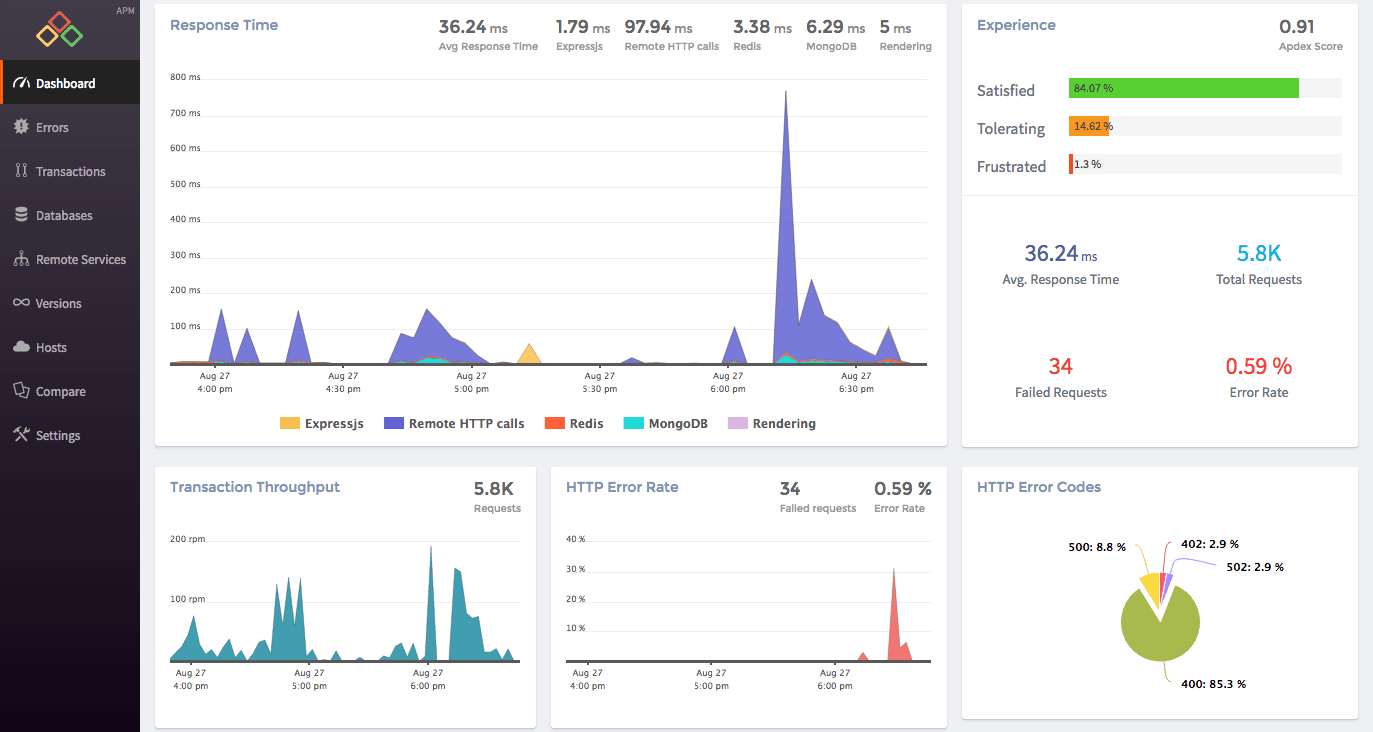Node.js is an open-source, cross-platform runtime environment for developing server-side and networking applications. Developers can use this tool for the project of modern web development.
For modern web developers, Node.js provides a set of IDEs and libraries of JavaScript segments. It simplifies the development process of web applications, using its modules.
Server-side programming has become an ongoing trend as the utility and popularity of JavaScript is growing with time. So, developers and software engineers decided to make a callback concept and started using the event-driven Node.js application.
Node JS development witnessed rising popularity as one of the JS frameworks and tools, to design and deploy an operating system, with rich user experience.
The latest application of Node.js runs on the V8 JavaScript engine which is also used by Google Chrome, giving a super-fast performance.
Experts at eSparkBiz have hands on experience in working with Node JS and have brought out the Key Facts on effective Node JS Development in this article.
Myths and Truths About Node JS Development
It has been just about a decade that Node JS came to the market. Since then, the top companies of the world are using this software for development.
Truths
If you are looking to hire nodejs developers In India, you should know that Node.js is a server powerhouse that edits and adjust their work, post-setup. Node is essential to work in a runtime environment as it processes the requests it receives in the code as an event loop.
The JavaScript ecosystem is a versatile environment for app development. With the Node JS tool, you can handle it easily using Vue JS, Gulp, Sublime text, UIs, and connectors.
JavaScript and Node together allow us to create an easily accessible web server by running a small section of codes.
But, there are some myths about Node JS development on the Internet, which need to be busted, such are mentioned below.
Myths
- Like Meteor and Mojito, Node.js is also a framework
- It can run only on Chrome V8 engine
- Node.js does not run on multi-threads
- It has complex coding and beginners cannot work.
Facts About Node JS And Their Explanation:
Node.js is a server-side runtime environment that you can execute in JavaScript.
The JavaScript engine that controls Google Chrome is V8. V8 implements the runtime conditions in which the code of JavaScript performs. The browser renders the DOM and the other internet APIs that make it run smoothly.
It provides asynchronous and event-driven APIs.
JavaScript and Node JS are both asynchronous. In the case of asynchronous programming, the code pattern complies with a different execution pattern.
A piece of programmable logic does not stop the execution of another similar section when the JavaScript and Node.js are asynchronous. The two logical segments of coded information are completely independent of each other.
This autonomous execution of code enhances system performance and throughput. Asynchronous programming in Node.js development helps in faster execution but comes at an expense. The price is high due to its callback feature.
Using Node along with the basic knowledge of JavaScript can help in quick development.
During the rudimentary stages, JavaScript was used for front-end web development but now using Node.js, JavaScript can be used to write back-end codes for contemporary web development.
Using Node JS is simple because if you have hands-on knowledge in JavaScript, you can use your coding skills to develop apps in the browser. Developers who can perfect several lines of a bug-free algorithm have good news.
Debugging blocks of code is very easy in JavaScript and thanks to the dynamic nature of JavaScript, developing codes in Node.js is a cakewalk if you have few months of experience.
Things To Know About Node.js
JSON Has Won
JSON or JavaScript Object Notation stands for practical composite data exchange format. JavaScript developers get the shot to build APIs promptly and cultivate interoperability.
It is so simple that you can phrase it in merely five railroad parse descriptions. JavaScript object notation, or JSON thus helps in dynamic data exchange and has become one of the mainstays of JavaScript.
Programmers in earlier days had to prudently manipulate the JavaScript data as there was no dynamic data in a browser.
The birth of global purpose NoSQL databases, like MongoDB, was possible thanks to JSON. What developers once intended for JS has now become the international standard.
JavaScript Is Everywhere
JavaScript is an object-oriented programming language like other machine level languages. We operate JavaScript to develop applications in the browser in different frameworks that are available in the software world.
JavaScript is ubiquitous. It gives us the privilege to work around the event-loop process efficiently. The icing on the cake is that we can demonstrate using JavaScript across several OS environments.
GitHub claims that JS is the most widespread web development language. The adoption of Node.js with JavaScript enables you to build on the server-side.
As a programmer when you compare JavaScript with other OOP languages like Python and Ruby, you will see that JS has better productivity and performance.
Sharing Is Encouraged
Sharing a package of library codes may sound like a difficult task but it is possible. The Node.js community is liberal, who believes that sharing is caring.
There are some ways in which you can legally share the package. Distributing library functions to others is easier than ever using Node.js Package Manager.
You can share all the 50,000 packages to your developer friends who are designing another project. When a Node JS library package is shared, it attaches to C libraries like OpenCV and Tesseract.
You can also create and code some new package yourself and share it with the new developers. Everyone can make use of the logic that you created and save their time in completing a project.
Node Package Manager Working Principle
We can dispose of all Node JS developments using the node package manager. It provides several cloud platform services such as PaaS providers for Node.js.
Of late, the Node JS functionality witnessed widespread growth and development thanks to its dependable package management.
Batteries Not Included
Node.js apps are not a concrete whole. For ease of use, the modules are broken into smaller sections which are then integrated and shared. Developers can design these packages from scratch.
This carefree method of working with Node JS Development community prompts them to experiment with their production. The developers handle one task at a time when the experiments are complete they carry out the execution.
Instrumentation
Node JS is known as a properly instrumented production tool in the software world. Working with Node JS helps the developer to make an app for production predisposition and execution.
The best practices of Node JS in modern web building find advantages with enhanced tools and documentation. With every update and new change, this tool is progressing as an undoable app for web development.
Node Package Manager is the functionality that the Node JS has. It is a utility tool; considered primary, for most implementation systems associated with the Node.js development ecosystem.
NPM has two things, a CLI and a database of packages called the registry which maintains the local project units as well as the public JavaScript tools.
NPM instrumentation helps you to design and manage your Node JS modules. Since each unit focuses on one task at a time, the outcome is very effective.
With instrumentation available at every grade of app progress we can expect the best production, and aptness of functionality.
Powered By Google Chrome
Node.js runs in the background and it is fuelled by the supremely powerful Google V8 engine. For the uninitiated, this is the same runtime engine that Google Chrome uses to execute JavaScript codes in the front-end.
Node JS is remarkable because no less than Google regards it among other systems engine powers. Apart from using the Google developer tools, you can debug an erroneous code with ease.
By using Google’s V8 engine, Node.js debugs the back-end. Our gratitude to the development team of Node.js at Google for making the most expeditious and most influential environments running on JavaScript.
Wide Library Of Code
Do you know that Node.js has an impressive library of dependencies, commonly called the Node Package manager?
The utility of this package manager is to provide dependable package management where the node ecosystem will allow you to carry the development tasks.
Suitable packages for projects are available for public usage in the Node JS community.
Using these packages, developers can scale up their projects by adding better functionalities. The library of code is the foundation on which any project grows and sustains.
Small Modules Works Fast
The very popular framework of Node.js can be split into several miniature modules. The most well-known pair of such modules are Node.js application and Node.js Core. We can choose to use this pair according to the client’s requirements.
A thumb rule is that if we make our modules small and lightweight, it will compile faster and generate the output without any hassle. Owing to this, associations are now considering smaller modules to be a key for smoother functioning of Node.js development services.
Node.js Architecture

Single-Threaded: Unlike other tools, Node.js works on a single thread.
Event Loop: The event loop in Node.js enables non-blocking input-output operations despite the single-threaded feature.
A commit traversing through Node passes a series of callbacks. If you are calling the event, you can use the functions from the library, and queue the process with asynchronous events.
Non-Blocking I/O: This logical loop runs on an individual thread, while the runtime tasks are accomplished asynchronously on the developer’s task list
It reflects the output via recursion to the event circuit thread. For this great non-blocking approach of handling coding, Node JS development is so popular.
Front-End Development: This development comprises the web view. Whatever is coded here is reflected on the user’s screen.
It deals with the coding for UI interface, handling events, and interacting with the back-end server to extract data to the front-end user interface.
The front end environment is a manifestation of the JavaScript that is written as per requirement. It is the place where the user can do his job.
Back-End Development: The back-end involves brainstorming the codes to determine how the functional tasks are going to be carried out once the user inputs a transaction.
The workflow happens from web browser to web server to client-server and the database in a tiered architecture.
This is a technical work, usually not visible to the user. Programmers complete back-end development with server-side scripting and database communication. We can then retrieve the data from the front end.
Asynchronous & Event-Driven
Asynchronous, a design pattern, refers to the actions that can happen independently, regardless of the main execution stream. In short, it automatically assumes an event. This enhances the efficiency of the system by a huge margin.
Event-Driven refers to the actions that are taken concerning an occurrence. In short, it waits for an event to happen.
In this case, the API of Node.js is asynchronous by nature. It never waits for an API to return any data whatsoever.
An example of such code is written below:
var fs = require("fs");
fs.readFile('inputfile.txt', function (err, data) {
if (err) return console.error(err);
console.log(data.toString());
});
console.log("I will print first");
Single-Threaded
Single-threaded or single-threaded processes are those which contain executions of some instruction in a single thread, driven by a command.
In the case of Node.js, it uses a single-threaded model for looping events. The mechanisms of events help the server to respond in a way that makes the server scalable to a high extent as compared to traditional servers, which limits threads to maintenance requests.
Utility Modules

Utility modules contain ora-fn functions for various things such as handling strings and its dates.
Node.js contains a lot of Utility Modules, some are mentioned below:
OS Module – It provides the basic utility functions to the system of operation.
Net Module – It is in charge of providing servers and clients as streams, while acting as a network wrapper.
Domain Modules – It is used to handle operations of multiple I/O acting as a single group.
Path Module – It handles and transforms file paths by providing utilities.
DNS Module – It is in charge of providing functions to DNS lookups and its underlying operating system.
Full Stack Development
The full stack consists of both backend and frontend development. These days, anyone can develop on both ends using JavaScript.
Although there are a lot of languages that can be used to develop either of the ends, JavaScript is the simplest among all.
Node is the one that helps to dissolve the boundaries between a server and browser. In the Node.js community, the sharing of library code packages is one of the easiest ones.
Since there are a countless number of packages included, Node comes with its own Package Manager as well, searching for a specific package effortlessly.
Tip: In Node, one just needs to focus only on two things – JavaScript and Database stack.
Node.js Is Very Fast
With the utilization of the V8 engine, the execution of JS happens at extreme speeds, thanks to the V8 for taking the JS as a native machine code.
One more advantage it has is its event loop. This runs on a single thread, which helps to perform every execution asynchronously and run everything smooth as silk.
Using Node.js helps to experience the vital building operations effortlessly by enhancing the readings and writings to network connection, database, etc.
Real-Time Power
Node.js has some real powers, without any doubt. What makes it excellent is its ability to work in many concurrent connections at the same time.
These days multi-user requirement is very essential and Node.js is one that can handle such things with ease, all thanks to its event loop, its real power over time.
This is also known as a two-way communication system between the client and its server. Within this very system, the client sends data to the server and vice-versa.
Below is an example of how it works:
var app = require(‘http’).createServer(handler)
var io = require(‘socket.io’)(app);
app.listen(8080);
io.on(‘connection’, function (socket) {
// Send a message to the client
socket.emit(‘event to client’, { hello: ‘world’ });
// Handle a message from the client
socket.on(‘event from client, function (data) {
console.log(data);
});
});
Future Driven
It is not possible to predict the future, one can only assume. Thus, there is no guarantee on how long a particular thing is going to last. However, things are a bit different for this. It is open-sourced and there are many projects run by independent volunteers in it.
On top of that, it also has corporate caretakers and sponsors with the likes of tech giants like Microsoft and PayPal. This is enough to indicate that it is going to stay here for the time being.
Microservices Are Awesome

There’s no denying that Node.js microservices are awesome. With its presence on both ends – front and back, they have ensured that they play a big role.
One of the essential capabilities is their ability to divide the logic of applications into smaller portions of modules, ensuring better flexibility.
They also help minimize the wastage by adding more microservices to the previous version.
In short, they make the apps more lightweight and superior.
Compatibility With Various Web Browsers
JS is, without any doubt, the simplest and easiest way of developing an app, as per the requirement. JS is one of the few languages where there are no compatibility issues and even if there is a minor issue, it is easy to resolve.
With the addition of Node, it has become more fun. It has now become almost invincible in the world of programming languages.
Pros & Cons Of Node.js
Pros Of Node.js
- Acts As A Bridge Between Frontend And Backend –It acts as a bridge between backend and frontend and thanks to its asynchronous nature, the development across platforms has become extremely convenient.
- Easy To Learn –It is easy to learn for any developer, who has some exposure to JavaScript.
- Enhance Performance –Without a single doubt, it can enhance performance, making the program efficient. Thanks to its ability to handle multiple concurrent users at the same time.
- Made For Scalability –E-commerce and scalability are now a big thing and this language is made keeping such accounts in mind.
- Big Community – It has an ever-growing community, wide enough to help developers resolve complex issues.
- NPM –It has one of the biggest package managers as compared to other languages.
- Plugins –There are countless plugins available for its development, and these take care of various functionalities and features of the programming language for a better experience.
- Data Streaming –Yes, it is made keeping it in the account, making it highly capable.
- Open-sourced –Yes, it is open-sourced, and thus, finding someone with the right skills set shouldn’t be an issue.
- Single-Threaded –It is single-threaded and has an event-driven architecture. This helps when other technologies consume a huge chunk of memory for creating an additional thread for each request, it does not.
- Lightweight –The platforms built with it are extremely lightweight, and they load a lot quicker than their competitors.
Cons Of Node.js
- Performance Bottlenecks –So far, this is the biggest drawback. Its inability to process CPU bound tasks.
- Immaturity Of Tooling –Despite the core modules, which are quite stable and can be considered mature, there are also some tools in the npm registry of poor quality or not properly documented/tested ones.
- Growing Demand For Experienced Professionals –There is a common disbelief that all JavaScript developers are Node.js developers, which is not true at all.
- Callback Hell Issue –It relies heavily on callbacks which runs after each task. The problem comes when several queued tasks are in the background, each with its callback. This often results in this callback hell, impacting the quality of code.
What Node.js Is Great For?
Chat
It indeed is beneficial to build an app to chat for mobile.
The benefits for such are mentioned below:
- It helps in the creation of scalable and robust mobile applications.
- Enables the speedier development procedure.
- Easy to install.
- Offers higher performance.
- Takes less time in development.
Server-Side Web Apps
The benefits for such are mentioned below:
- It has a ubiquitous runtime.
- Made for fast and scalable projects.
- Extremely easy to learn and code.
- It is extensible.
- Very dynamic NPM.
- It helps to increase productivity.
- Indeed a platform made for data streaming.
Data Streaming
The benefits for such are mentioned below:
- Offers super fast-processing, ideal for streaming.
- It has a robust technology stack to back it.
- Super easy to install.
- It is scalable, something everyone is looking into.
Monitoring Dashboard

The benefits for such are mentioned below:
- Helps to provide live and precise error reports.
- It is one of the few to support full-stack error reporting.
- Offers quick real-time user session monitoring
- Provides server performance monitoring and bottleneck detection real-time
Conclusion
Even though it has some Cons, the Pros are more in number and no wonder why it is still the most popular choice of developers.
There are countless reasons why Node js Development Services has advantages over countless other programming languages and thus, there is absolutely no slowing down of its use.
So, that was all for now.
Happy programming!


-
Why Was Node.js Created?
Node.js was created by Ryan Dahl. The main purpose of this run-time environment is to solve complex issues on the server-side. It provides a seamless solution for problems that were difficult to solve in the synchronous era.
-
What Are The Important Facts About Node.js?
There are many important facts about node.js development. Some of the most common ones that everyone needs to know are as follows:
JavaScript Is Everywhere
JSON Plays A Major Role
Sharing Is Encouraged
Powered By Google Chrome Engine
Asynchronous & Event-Driven
NPM & Instrumentation -
Is Node.js Good For Backend?
The simple answer to this question would be YES. Node.js is smooth, secure, and scalable. So, building a backend with node.js will add power and seamless to your application. That’s why you choose Node.js for the backend.
-
Who Makes Use Of Node.js?
There are many leading websites and mobile apps that are making use of the Node.js framework. Some of the most popular ones are listed below:
Netflix
PayPal
Twitter
Walmart
Uber
LinkedIn -
What Node.js Is Good For?
There are a variety of scenarios or the use cases where node.js can play a major role. Some of them are as follows:
Chat Application
Data Streaming Apps
Real-Time Data Sharing
Collaboration Tools
Server-Side Web Apps -
Is Node.js Still Relevant?
Oh.! YES. Node.js is still very relevant and popular in 2023. The improved satisfaction and productivity have made Node.js a household name.











